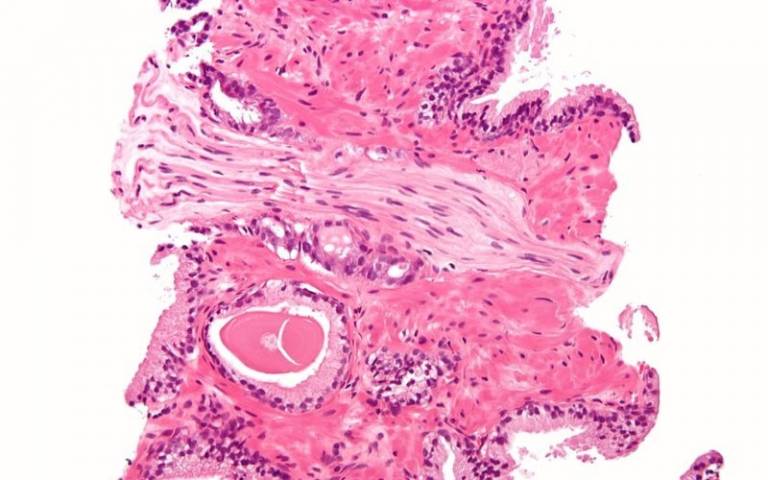Giving the drug abiraterone alongside standard hormone therapy helps men with high-risk prostate cancer that has not spread elsewhere in the body to live longer, according to preliminary results of a UCL-led trial.

This result from the STAMPEDE trial, based at the MRC Clinical Trials Unit at UCL and funded by Cancer Research UK and MRC, was presented today at the European Society for Medical Oncology (ESMO) Congress.
Lead researcher Professor Gert Attard (UCL Cancer Institute) presented an analysis of the impact of abiraterone, when used either with or without another drug, enzalutamide, when added to standard hormone therapy for men with prostate cancer where conventional imaging shows it has not spread elsewhere in the body.
988 men were randomised to receive standard of care (hormone therapy with or without radiotherapy). They were compared to 986 men who were randomised to receive abiraterone, plus standard of care (hormone therapy with or without radiotherapy). Of those in the abiraterone group, 527 men also received enzalutamide.
Abiraterone (Zytiga) is a type of hormone therapy that works in a different way to standard hormone therapy. Abiraterone is currently licensed to treat prostate cancer that's spread to other parts of the body or has stopped responding to standard hormone therapy.
The proportion of men whose cancer hadn't spread after six years in the 'abiraterone-based therapy group; was 82%, compared with 69% in the 'standard of care' group.
The proportion of men alive after six years in the 'abiraterone with or without enzalutamide' group was 86%, compared with 77% in the 'standard of care' group.
Professor Attard said: "The results are excellent news for us and our patients. Two years of abiraterone compared with standard treatment at diagnosis cures a significant proportion of men and delays the time to spread of the cancer. This translates into a very significant improvement in life expectancy for men with high-risk prostate cancer that's not spread beyond the prostate on conventional imaging."
Dr Claire Amos (MRC Clinical Trials Unit at UCL), operational lead for the trial, said "This is a great result and one that would not be possible without the enormous efforts of the hospital staff who recruit and treat patients in the trial. Most importantly, we must thank the patients for agreeing to take part, none of this would be possible without them and these findings will be of great benefit to others in the future."
Professor Mahesh Parmar, director of the MRC Clinical Trials Unit at UCL, said: "The STAMPEDE trial is the largest of its kind in high-risk prostate cancer and this has allowed us to combine data from a number of the research arms to get a robust and reliable result for this group of patients whose cancer has not spread. The results are very clear and impressive, and it is fantastic that using abiraterone improves the length of time before the disease spreads and improves the number of men surviving this disease."
Professor Nick James, professor of prostate and bladder cancer research at the Institute of Cancer Research London and consultant clinical oncologist at The Royal Marsden NHS Foundation Trust, is chief investigator of the STAMPEDE trial. He said: "STAMPEDE is a practice changing trial that continues to make great strides in changing prostate cancer research and treatment. The depth and breadth of the trial has allowed us to examine aspects of care not studied in more focused trials.
Today's results are the first study of intensified hormone therapy in this group. The results show that all men with high-risk prostate cancer that's not spread to other parts of the body benefit substantially from two years of abiraterone treatment. Our findings will change the current standard of care worldwide. We are in active discussions with NHS England about how these findings can be implemented."
A research paper with more details has been submitted to a journal and is undergoing peer review.
The STAMPEDE trial is funded by Cancer Research UK, the Medical Research Council, Astellas, Clovis Oncology, Janssen, Novartis, Pfizer and Sanofi-Aventis.






